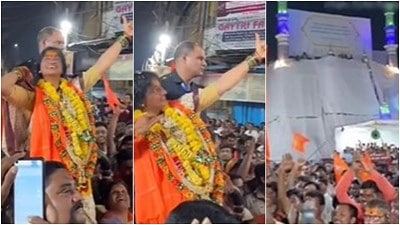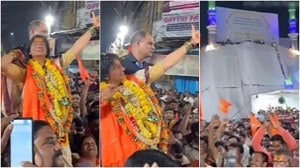- India
- International
Mini schools from home help students beat lockdown blues, learn Japanese in Maharashtra
Split up in groups of five to 10, 600 children of this Marathi medium school are simultaneously attending the session from 34 locations, all of which have blackboards and smartphones, with a parent volunteer overseeing the students.
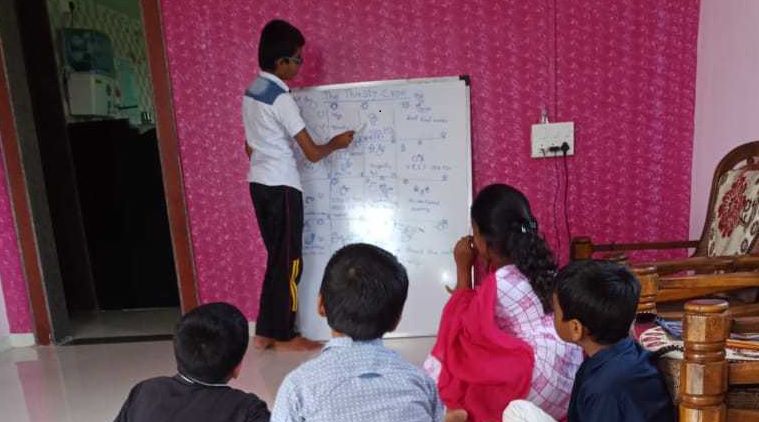 Dhruva Yadav (standing next to the board) taking lessons as his younger brother, Rudra (in the black T-shirt), other students watch on at Pune’s Shikrapur. Their mother Rohini hosts the study group daily. (Express Photo)
Dhruva Yadav (standing next to the board) taking lessons as his younger brother, Rudra (in the black T-shirt), other students watch on at Pune’s Shikrapur. Their mother Rohini hosts the study group daily. (Express Photo)
“Tori va igirisu de nan to ii mas ka,” inquired eight-year-old Rudra Yadav, looking towards his elder brother Dhruva, 14. Pat comes the reply. “Tori va igirisu de bird to ii mas,” Dhruva said.
Assembled in the living room of their house in Pune’s Shikrapur taluka along with eight other children, the brothers are speaking animatedly in Japanese, even as their mother Rohini, also the group’s Palak Mitra (parent friend), watches on.
The situational chat — where Rudra is asking his brother in Japanese what “tori va” (bird) is called in English and Dhruva responds by saying “it is called a bird” — is a part of a class in progress at Pune’s Wablewadi Zilla Parishad (ZP) School, being taken online by Aurangabad-based language trainer Sunil Jogdev.
Split up in groups of five to 10, 600 children of this Marathi medium school are simultaneously attending the session from 34 locations, all of which have blackboards and smartphones, with a parent volunteer overseeing the students.
While school campuses remain close amid the lockdown, these students have been assembling daily from 7 am to 11 am in such small groups, mainly at homes or verandahs of the parent volunteer, to continue their education.

School Principal Dattatray Ware claimed his students have already finished their textbook curriculum and are now onto imbibing some additional skills. “We began in April. The parents and their wards embraced the new model. The students are already through with their textbook lessons. We have held a course in spoken English. They are now learning to speak Japanese.”
About 160 km away in Bembylachiwadi, a small hillside village in Marathwada’s Aurangabad, Yogesh Bahure (22), an MPSC aspirant, receives a WhatsApp message from Mahindra Dahibhate, the local ZP teacher, on the lessons he must give a similarly assembled group of children in his courtyard.
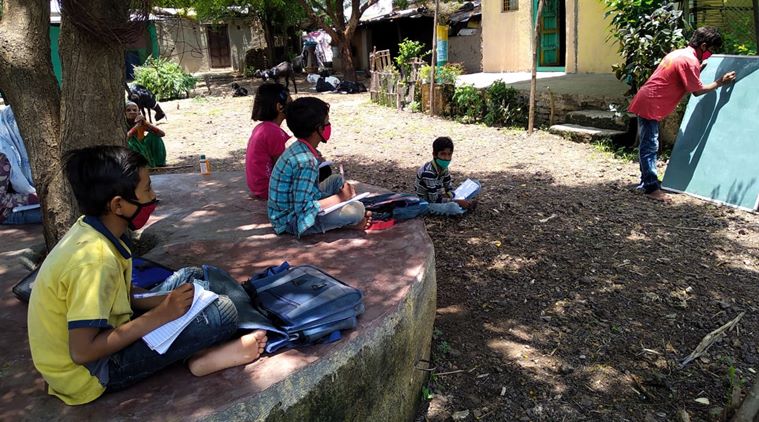 A group of students from Aurangabad’s Bemblyachiwadi school assemble around a tree for their makeshift classroom.(Express Photo)
A group of students from Aurangabad’s Bemblyachiwadi school assemble around a tree for their makeshift classroom.(Express Photo)
“I’m a Vishay Mitra (subject friend) for these students. I help them with their daily studies,” said Bahure, who had returned from Aurangabad city to the village after the lockdown was imposed in March. “I used to study in the same ZP school. It is good to give something back,” he added.
Drawing from the Pune school’s model, 43 ZP schools in Aurangabad’s Garkheda area have adopted this “mini school from home” from June 15. “This group learning model resolves the issue of lack of individual gadgets, smartphones and smart TVs in rural areas. Each group has one or more device that can be shared,” said Education Extension Officer Ramesh Thakur, who is spearheading the initiative in Garkheda.
Ware said the group learning model also addresses the requirement of social interaction while embracing e-learning. And parents play a key role in this community-enabled model.
“Five to 10 students are grouped together on the basis of common geographical space (gully, mohalla and basti). We have 34 such groups in our schools. Each teacher is responsible for two to three groups. Palak Mitras appointed by the school host the students and are responsible for their health and safety. They are given sanitisers, masks, blackboards and chalks. They are also trained on how to help the students,” said Ware.
To help students in their day-to-day learning, one pupil, from a higher class, or a former student, is roped in as Vishay Mitra. While the teachers visit the groups once or twice a week, the Vishay Mitras take instructions from them on daily lessons to be imparted. They also provide a daily feedback on a student’s progress. Apart from textbook lessons, teachers are encouraged to devise content-based projects.
“The initiative is being well received. The response from parents and students have been encouraging,” said Thakur, who is hopeful of it being replicated in other schools of Aurangabad.
Sainath Rathod, a Police Patil in Gadiwat village of Aurangabad, said: “I’m a Palak Mitra. Teachers are doing their best. It is our duty to help them.”
After some engineering graduates from this backward village landed high-paying jobs, the local community has been more responsive towards education, said ZP teacher Dadasaheb Navpute, who has formed 30 groups of 400 children who study in his school.
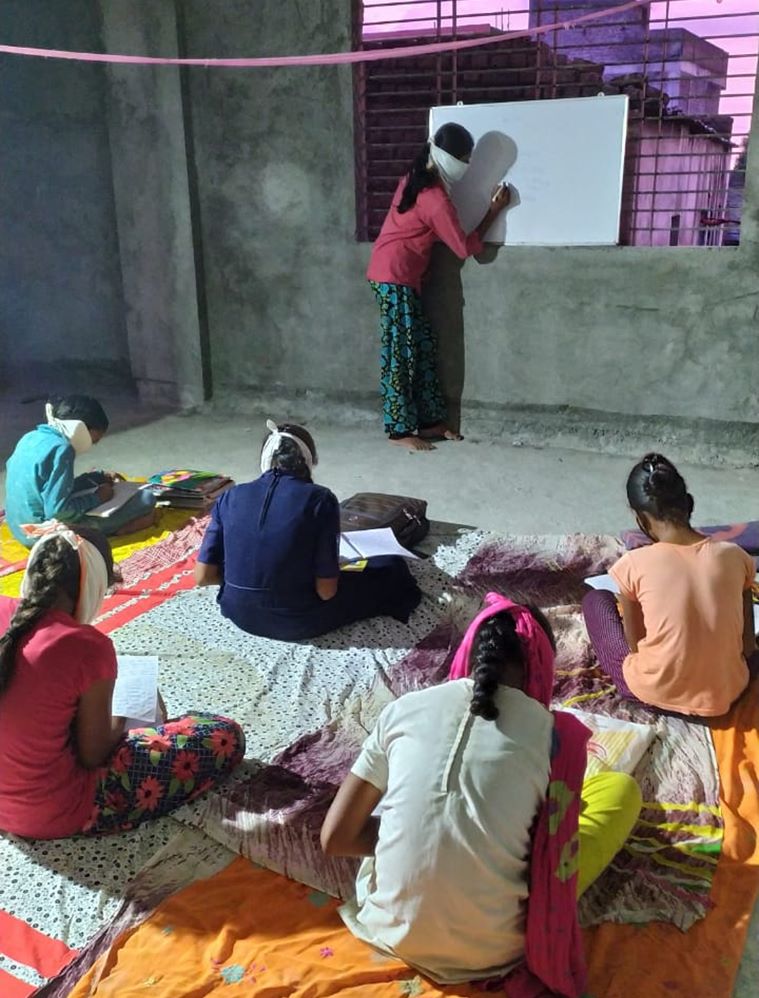 A study group of girls from Aurangabad’s Gadiwat village.(Express Photo)
A study group of girls from Aurangabad’s Gadiwat village.(Express Photo)
“Children from private schools also join these groups sometimes,” he added. The Gadiwat ZP school had stood third in the National Robotics Championship earlier this year.
With the word spreading, Beed district has now decided to adopt the model for its 2,500-odd ZP schools. Ajit Kumbhar, Chief Executive Officer of Beed ZP, said: “We were the first district to customise a learning app. We are now focussing on adoption of group learning across the district. We have already formed groups for 75 per cent of our schools.”
Back in Wablewadi, Rudra’s mother Rohini Yadav said, “Hosting the children has also helped me pick up some Japanese words and maths tricks.” When prodded, she added, “Doomoo arigato gozaimas (Thank you very much).”
Apr 18: Latest News
- 01
- 02
- 03
- 04
- 05











